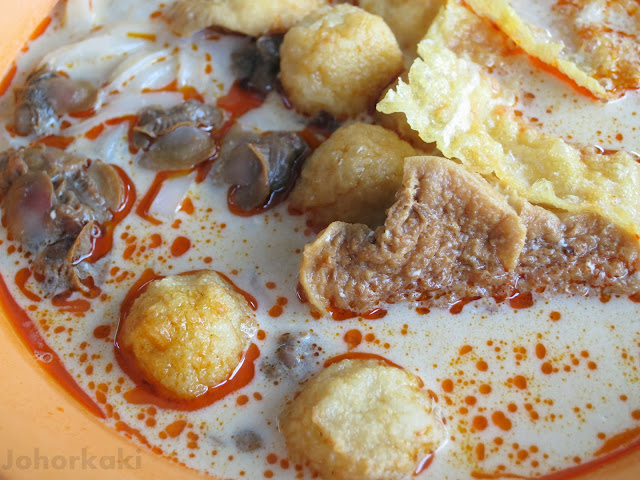
During my foodspotting in Johor Bahru, I have tried many laksa stalls from the famous to the obscure. All the laksa stalls have their own stories. This is just one of the many stories - the story behind four of the most popular laksa stalls in Johor Bahru today.
My curiosity was piqued when I noticed that the laksa of Lee Kee, Tan Kee, Sam Kong and the laksa stall at Siak Hong are very similar.

They all use a soup base made by boiling anchovies and soy beans just like those at old school wanton mee stalls and fish ball noodle stalls. To the umami flavoured soup base, they add curry spices and santan (coconut milk).
While the curry broth is not very lemak, it has body and is savoury, flavourful and fragrant. Personally, I like this curry as it's body come from anchovies and soy beans rather than rely heavily on santan.

They all have this thin and crispy fried tofu skin served with the laksa.
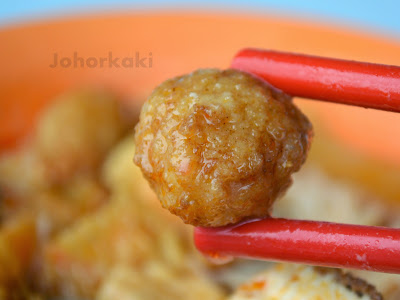
The laksa comes with these handmade fried Ikan Parang fish balls.
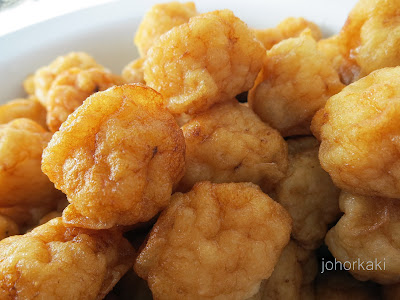
The fish balls have good mouth feel and release a nice, distinct fish flavour and aroma with every bite. The stall holders make these fish balls from fresh Ikan Parang fish everyday.
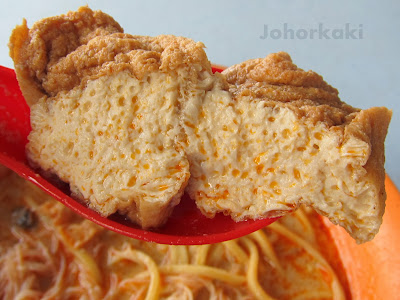
The laksa comes with fried fresh tofu. A layer of rough fried brown skin with the white inside still soft and smells of soy beans.
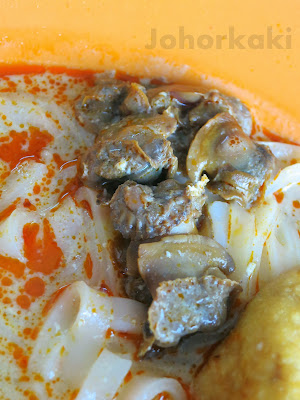
The laksa comes with fresh cockles (see hum) which the hawkers shell daily.
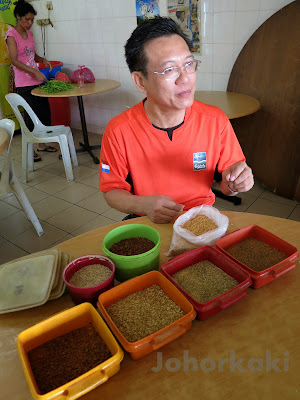
I stumbled upon their story when I visited Sam Kong restaurant run by Mr. Yong in Kampung Ungku Mohsin.
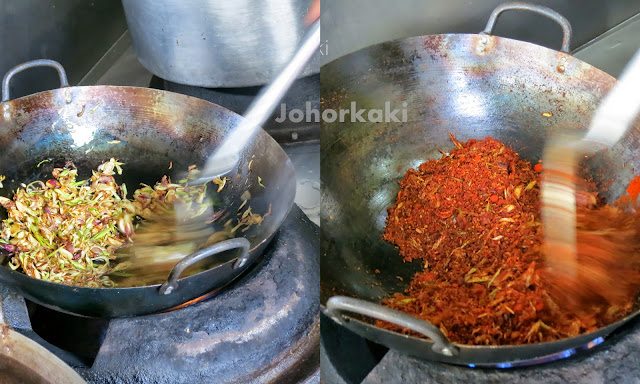
Mr. Yong was showing me the curry spices that are used to make the laksa.

Johor Laksa Pioneers. A - Mr. Yong's grandfather. B - Mr. Yong's father. (Photo credit: Thanks to Joan, the great-great-granddaughter of old Mr. Yong.)
According to Mr. Yong, the origins of this style of Johor laksa dates back to pre-War Johor Bahru. A man from Guangxi taught Mr. Yong's grandfather how to use the spices available at Johor Bahru's "Little India" along Jalan Trus to make laksa before he returned to China.
Mr. Yong's grandfather used to run the laksa stall at the Foon Yew school which used to be in a bungalow belonging to Tan Hiok Nee, the Kapitan Cina at the time. The school tuck shop was under the bungalow which was on stilts.
The Japanese came in 1942 and left only 3 years later. After the war, at the request of his neighbour Mdm Lee, Mr. Yong's grandfather taught her the laksa recipe on the condition that she does not sell her laksa on the same street at Jalan Trus.
So, hardy Mdm Lee balanced the heavy pots of laksa across her shoulders and sold laksa by walking the streets of Johor Bahru.
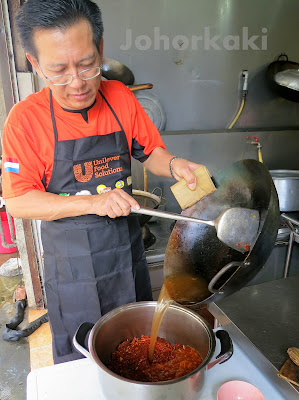
Today, Mr. Yong who runs Sam Kong restaurant at #8-H, Jalan Ungku Mohsin still uses the same laksa recipe handed down by his grandfather.
Mdm Lee in turn spun off three stalls.
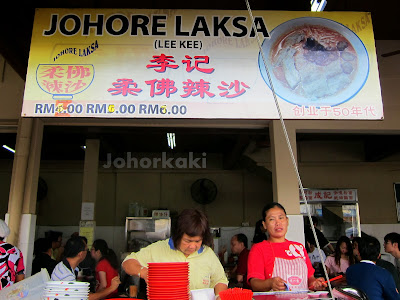
Today, Mdm Lee's son and daughter-in-law carry on the Lee Kee brand at Kee Kim Huat kopitiam at #80, Jalan Badik in Taman Sri Tebrau.
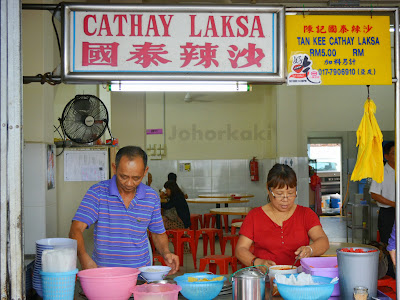
One of Mdm Lee's daughters and one of her workers are now the cheerful husband and wife team running Tan Kee in Shang Ji kopitiam at #149, Jalan Lumba Kuda. Tan Kee is famously known as Cathay Laksa because they used to run the stall near the now demolished Cathay cinema.
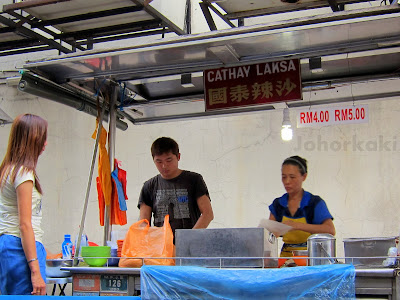
Mdm Lee's niece runs the popular laksa stall at what locals call "Siak Hong", the dozen of back lane stalls behind the Standard Charter Bank off Jalan Tebrau (opposite Plaza Pelangi). She also uses the brand name "Cathay Laksa".

During my foodspotting in Johor Bahru, I have tried many laksa stalls from the famous to the obscure. All the laksa stalls have their own stories. This is just one of the many stories - the story behind four of the most popular laksa stalls in Johor Bahru today.
My curiosity was piqued when I noticed that the laksa of Lee Kee, Tan Kee, Sam Kong and the laksa stall at Siak Hong are very similar.

They all use a soup base made by boiling anchovies and soy beans just like those at old school wanton mee stalls and fish ball noodle stalls. To the umami flavoured soup base, they add curry spices and santan (coconut milk).
While the curry broth is not very lemak, it has body and is savoury, flavourful and fragrant. Personally, I like this curry as it's body come from anchovies and soy beans rather than rely heavily on santan.

They all have this thin and crispy fried tofu skin served with the laksa.

The laksa comes with these handmade fried Ikan Parang fish balls.

The fish balls have good mouth feel and release a nice, distinct fish flavour and aroma with every bite. The stall holders make these fish balls from fresh Ikan Parang fish everyday.

The laksa comes with fried fresh tofu. A layer of rough fried brown skin with the white inside still soft and smells of soy beans.

The laksa comes with fresh cockles (see hum) which the hawkers shell daily.

I stumbled upon their story when I visited Sam Kong restaurant run by Mr. Yong in Kampung Ungku Mohsin.

Mr. Yong was showing me the curry spices that are used to make the laksa.

Johor Laksa Pioneers. A - Mr. Yong's grandfather. B - Mr. Yong's father. (Photo credit: Thanks to Joan, the great-great-granddaughter of old Mr. Yong.)
According to Mr. Yong, the origins of this style of Johor laksa dates back to pre-War Johor Bahru. A man from Guangxi taught Mr. Yong's grandfather how to use the spices available at Johor Bahru's "Little India" along Jalan Trus to make laksa before he returned to China.
Mr. Yong's grandfather used to run the laksa stall at the Foon Yew school which used to be in a bungalow belonging to Tan Hiok Nee, the Kapitan Cina at the time. The school tuck shop was under the bungalow which was on stilts.
The Japanese came in 1942 and left only 3 years later. After the war, at the request of his neighbour Mdm Lee, Mr. Yong's grandfather taught her the laksa recipe on the condition that she does not sell her laksa on the same street at Jalan Trus.
So, hardy Mdm Lee balanced the heavy pots of laksa across her shoulders and sold laksa by walking the streets of Johor Bahru.

Today, Mr. Yong who runs Sam Kong restaurant at #8-H, Jalan Ungku Mohsin still uses the same laksa recipe handed down by his grandfather.
Mdm Lee in turn spun off three stalls.

Today, Mdm Lee's son and daughter-in-law carry on the Lee Kee brand at Kee Kim Huat kopitiam at #80, Jalan Badik in Taman Sri Tebrau.

One of Mdm Lee's daughters and one of her workers are now the cheerful husband and wife team running Tan Kee in Shang Ji kopitiam at #149, Jalan Lumba Kuda. Tan Kee is famously known as Cathay Laksa because they used to run the stall near the now demolished Cathay cinema.

Mdm Lee's niece runs the popular laksa stall at what locals call "Siak Hong", the dozen of back lane stalls behind the Standard Charter Bank off Jalan Tebrau (opposite Plaza Pelangi). She also uses the brand name "Cathay Laksa".
No comments:
Post a Comment